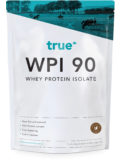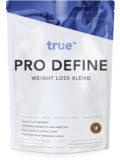After 11 years in the industry, it’s clear Roslyn Yee doesn’t rest on her laurels, having made her mark in clinical dietetics, returned to the classroom to specialise in sports nutrition, built up her own successful private practice and is now shifting into first gear once again to explore a brand new path in product development with True Protein.
Commuting over 180km to and from the Central Coast each day, Ros took up the newly appointed Sports Dietitian position here at True back in February and has hit the ground running ever since; writing expert articles, advising on a range of exciting new products and developing innovative new formulas with sports and all areas of health in mind.
We sat down with Ros to find out everything from how she got started to the nitty-gritty of the industry.

Firstly, let’s clear up exactly what a sports dietitian is…
A sports dietitian is essentially an accredited practising dietitian that has completed further education and training that’s specific to sports nutrition. They’re the health professionals who will be giving practical advice to athletes of all different levels, from the recreational to elite, on how to perform better in their specific sport.
So, what’s the difference between a nutritionist and a dietitian?
Sometimes people use the terms interchangeably, but the biggest difference between a nutritionist and a dietitian is that a dietitian has a university degree and is accredited by the Dietitians Association of Australia. You have to go to university and study for a Bachelor of Nutrition and Dietetics, or a Masters in Dietetics, before you can register with the Dietitians Association of Australia and become an accredited practising dietitian, which means you have to undertake continuing professional development each year. A dietitian is also the only role that will be professionally recognised by Medicare and other Government organisations.
How long did you practise as a clinical dietitian before specialising in sport?
Around three years. I worked initially straight out of uni as a clinical dietitian in a hospital setting, mainly in oncology, neurology and age care.
What did that involve?
As a dietitian in neurology, I would see people when they had first had a stroke and would be suffering quite big deficits from that. They may be in a position where they can’t safely swallow food and water, they can’t walk, they can’t speak and they’re now bed-ridden. Because they can’t safely swallow there’s a risk of food and drink going into their lungs, so I would formulate a feed for them, making sure the person was nutritionally balanced whilst they’re in recovery from the stroke. They might even need to be fed through a tube that goes in through their nose, down the back of their throat and into their stomach, or it might go directly through their stomach wall.

Would you help develop this tube-fed formula?
Yes. There are a range of different feeds available, but I would have to calculate which was the most appropriate for the patient to meet their nutritional requirements, and I would then monitor their tolerance and symptoms throughout the recovery process.
That’s what I would do in the area of neurology, but for oncology, I was dealing with people who had been diagnosed with all different types of cancer. Sometimes I would see them as outpatients, so they would come into the hospital to get their chemotherapy and I would pull up a seat next to them while they’re having their treatment and talk to them about how they’re feeling and how they’re managing their symptoms. A lot of the symptoms during treatment would be affecting their nutrition and how they eat, and would often cause weight loss. I would help them with the different dietary practises they could implement to support their therapy and keep them well-nourished throughout. Sometimes they’d have symptoms of nausea, vomiting, diarrhoea and have lowered immunity as well, so I was making sure that I could support those symptoms and help to manage them so that the patient didn’t lose weight and have to stop their chemotherapy. I was essentially trying to keep them as healthy as possible whilst they went through such a harsh treatment and hard time in their life. It was also about supporting their families, and what they could do to help their loved ones.
How did that make you feel?
It was really rewarding knowing that you could be helpful to the patients and their families. It was also very hard at times as you see a lot of sad cases where people are terminally ill and in their final days. I had a lot of patients die during the process and at the time it was a pretty stressful job.
What made you want to move on from that type of role and into sports?
I love sports, it’s a personal interest and it has always been a passion of mine. I originally got into dietetics with the idea that I’d be working with sports teams and athletes one day, so I just decided to follow that dream and take the next step.
Were you doing any sports personally at the time?
I’ve always been active. I mean I started training when I was really young, below five, in gymnastics. I guess my main motivator for changing from a clinical dietitian to a sports dietitian and pursuing that pathway, leaving my very safe job at the hospital, was because I joined a local functional fitness gym. I really enjoyed that style of training and wanted to make sure I was eating and fuelling my body correctly and recovering properly from my workouts so I could train harder and see results.

Why did you decide to take up that type of fitness regime?
It was never about looking a certain a way. At that time I had just been diagnosed with Irritable Bowel Syndrome and an underactive thyroid, called hypothyroidism, and I’d lost about 9kg and felt weak. I found trying functional fitness and learning how to lift properly and train with like-minded people was really encouraging. Tracking your progress through your strength and fitness rather than through your body composition was just something I found a lot more appealing than a conventional gym setting.
So, following your journey thus far, how have you transitioned to end up here, working for True Protein?
After I left the hospital and studied for further qualifications at the Australian Institute of Sport to become an accredited sports dietitian, I opened my own private practice seeing people and athletes within the community. I suppose it was less emotionally draining as you’re dealing with people from a different end of the spectrum; people who are generally healthy and looking to improve their performance. I was also dealing with a lot of chronic diseases, so conditions like diabetes and the start of cardiovascular disease, high cholesterol and obesity, the type of lifestyle conditions that have a lot of modifiable risk factors. Very different from what I was dealing with at the hospital.
I did that for three years, then, for the transition to True, I decided to close off some areas of my business, so I still do some private practice work but I’ve just recently closed off face-to-face consultations as I no longer have time outside of the full-time job to be able to provide proper care.
That must have been quite a big decision...
Oh, definitely. When you open your own business, that’s your baby; it’s something you care about and you’ve worked hard for and you’ve seen it grow. Then you have to make the decision to cut something that is growing.
So why did you choose True to change your career direction again?
I knew about True before I started work here. I would always recommend the products to clients, and I also think my personal values align with the business values here. I believe in where True is going with the brand. I like that they provide supplements that are natural and specific to sports nutrition. They work and they’re not gimmicky as they’ve got an evidence base behind them, they’re not just full of fillers, hidden sugars and artificial flavours and colours. In private practice, you’re constantly providing education on how to read nutritional information panels, and how to compare sports nutrition supplements is just one element of that.
I also always think that you will get further in a team than you will on your own. It was appealing to me the direction True was going in, how they started in functional fitness and how they sponsored a lot of professional athletes. Everything that the job advertisement detailed just felt like “oh my God, I 100% want to work with this company!”
What’s the most interesting part of your job here?
I think it’s the product development. I haven’t been here for very long but I’ve already worked on some pretty cool products where I got to go into the blend room and trial ingredients, see how they taste and make sure I’m recommending the correct dosage to make sure we develop an awesome product. I think seeing your hard work come to life is the most exciting and rewarding part of the job for me. I want to see those products that I’m creating be well received by customers and see that they’re improving health and performance.
Which True products do you use?
I use the Vegan85. I have some intolerances with dairy and the Vegan85 is lactose and dairy free. I’m not vegetarian, but I’ve tried a lot of vegan proteins and have found they can be quite grainy, but True has a really smooth blend and is on point with the flavour. I think the chocolate flavour is really versatile. I like the idea of having a shake that is both sweet and satisfying, as I have a real sweet tooth.
Do you do anything else with the protein?
Yes, I like to trial different things. Sometimes I have to trial recipes for work, like protein bars, bliss balls, overnight oats and chia puddings. I also like to bump up the protein content of a lot of snack foods. I love the Strawberries & Cream, Piña Colada and Raw Coconut protein flavours mixed with yoghurt. I really like the fruity flavours with cottage cheese as well. The Piña Colada Protein Pops is my favourite protein recipe. It’s like a frozen ice cream cocktail. Piña colada is one of my go-to cocktail choices, so if you can replicate that into a healthy, high-protein ice cream, why not?!
.jpg)
With such an exciting career already behind you, do you have time to do anything else?!
Of course! Being busy is often used as an excuse, but I think people will make time for what is truly important to them. Having a balance is important to me to prevent burnout, and that’s why I like to train to clear my head. I try to head overseas every year to explore a new country and culture too. My most recent adventure was trekking in South America.
Overall, I’m pretty simple, I cherish time with my family and close friends, I have two dogs and four chickens who always make me laugh, especially my fur baby, Lola! I really enjoy learning new skills and being creative. Lately, I’ve been swamped with the reno of our first home, but that’s a good problem to have. In the past I’ve dabbled in pottery, floristry and food styling, and there are so many short courses I’m yet to tick off!
Look out for more from Ros in our True Life hub.










 Meal Preps
Meal Preps
 Nutrition Tips
Nutrition Tips
 Exercise
Exercise
 News & Updates
News & Updates
 Lifestyle
Lifestyle






Leave a comment